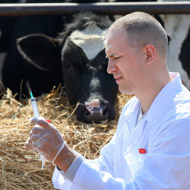
New report shows progress in achieving farm antibiotic targets
UK sales of antibiotics for food-producing animals have fallen 40 per cent since 2013, according to a report published by RUMA’s Targets Task Force.
The Targets Task Force: One Year On report also shows that the UK is one of the lowest users of antibiotics in Europe. It comes 12 months after industry-led targets for antibiotic use were identified for all main farm livestock species in the UK.
RUMA secretary general Chris Lloyd said: “What this review shows is the industry as a whole is committed and making good progress – but also that the sectors are all in very different places.
“Some species have met their targets already but now, with a measure of what’s happening in their sector, they know they can go further and are working on new goals. For others at or around their optimal level of use, progress is about animal health, continual refinements to what they do and working to overcome new diseases threats as they emerge.”
Mr Lloyd said that the pig sector is on course to meet its target reductions by 2020 but warned the next steps could require investment or some brave-decision making.
“Cattle and sheep farmers and their veterinary surgeons are also working on a range of interventions, although a lack of representative data on antibiotic use across these specific sectors continues to be a challenge,” he said. “If they had access to better data, this would give them more clarity over what is actually being used, and when – and where – improvements could be made.”
He also highlighted the importance of responsible reductions that do not compromise animal health and its associated welfare.
“The approach has to be sustainable with an end-goal of optimal – not zero – use. Antibiotics play an important role in preventing pain and suffering in our farm livestock as well as ensuring food safety. This is why it’s important to judge progress against the whole range of qualitative and quantitative measures in the review.”



 The veterinary mental health charity Vetlife is inviting the veterinary community to join it for a sponsored cold-water dip.
The veterinary mental health charity Vetlife is inviting the veterinary community to join it for a sponsored cold-water dip.